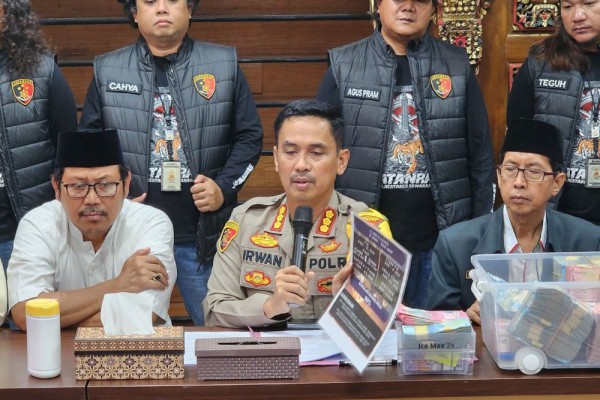Amnesty International Demands Accountability for Fatal Police Shootings in Indonesia
SEMARANG,RAKYAT NEWS – Amnesty International Indonesia has called for urgent investigations and accountability following two separate incidents in which police officers fatally shot civilians in Semarang and West Bangka on Sunday, November 24, 2024.
Usman Hamid, the Executive Director of Amnesty International Indonesia, responded strongly to these incidents, highlighting a worrying trend of police violence in the country.
“These two shootings in Semarang and West Bangka underscore a deeply concerning pattern of police brutality. These incidents follow closely on the heels of the recent case in South Solok, West Sumatra, where a senior police officer shot a junior officer. The rapid succession of these events raises important questions about the state of law enforcement in Indonesia,” Hamid stated.
The two incidents are raising alarm about the growing use of lethal force by the police. In particular, there is increasing concern that firearms, which should be a last resort in law enforcement, are becoming the primary method of handling situations, resulting in unnecessary loss of life.
The shooting in Semarang involved three individuals on motorcycles—identified as G, S, and A—who were reportedly shot early in the morning around 1 a.m. The victims, all students at a local vocational school, were allegedly shot after their motorcycle grazed a police vehicle. G, the victim who was fatally shot, succumbed to gunshot wounds to his hip, while S and A were injured but survived. Both S and A are currently receiving medical treatment in a hospital.
Semarang police have suggested that the shooting occurred during an attempt to break up a gang fight, with the victims allegedly being part of one of the gangs involved. However, a security guard at the scene disputes this account, claiming there was no gang conflict at the time. The police are continuing their investigation into the incident, but the conflicting statements have raised serious doubts about the justification for the use of lethal force.
In a separate incident later the same day, police in West Bangka shot and killed a man identified as B. The police claim B was caught stealing palm oil fruit from a plantation in the region. According to the police, the officers fired 12 warning shots before ultimately shooting B, who allegedly attempted to flee and ignored the warnings.
Amnesty International has condemned the West Bangka incident as an extrajudicial execution, noting that the use of lethal force in this case is a direct violation of both national and international laws. The group stresses that the police should not act as judge, jury, and executioner and that such actions are incompatible with the principles of justice.
“These events cannot be dismissed as isolated incidents. They reflect systemic failures in the procedures for using firearms and a troubling shift in the mindset of law enforcement officers, who are increasingly resorting to violent, repressive tactics instead of adopting more humane methods of policing,” Hamid stated.
Amnesty International is calling for the Indonesian Parliament (DPR RI) and the National Police Commission (Kompolnas) to conduct a thorough evaluation of the performance of the police force and its leadership. It is essential that full legal accountability be established not only for the officers directly involved in these shootings but also for the senior police officials who oversee and make decisions on the use of force.
The National Human Rights Commission (Komnas HAM) must also launch an independent investigation into these cases to ensure that any violations committed by police officers are properly addressed through a fair and impartial legal process.
The Indonesian government must also reconsider and revise its regulations regarding the use of firearms by law enforcement officers. Amnesty International emphasizes that firearms should only be used as a last resort, in accordance with the principles of legality, necessity, proportionality, and accountability.
Such revisions are critical to ensuring that law enforcement in Indonesia respects human rights and upholds the fundamental right to life. Without these changes, the risk of further abuses will remain high, leading to more unnecessary deaths at the hands of police officers.
Since the beginning of 2024, Amnesty International Indonesia has documented at least 31 extrajudicial killings by law enforcement, resulting in the deaths of 31 individuals. In the past month alone, there have been at least eight such incidents, with a majority of the perpetrators being police officers. This highlights an alarming trend of unchecked police violence throughout the country.
Extrajudicial killings are a serious violation of human rights, particularly the right to life, which is enshrined in both international and domestic law. Article 6 of the International Covenant on Civil and Political Rights (ICCPR) makes it clear that every individual has the inherent right to life and that no one should be arbitrarily deprived of it. Failure to hold police officers accountable for extrajudicial killings constitutes a grave violation of international human rights law.
In Indonesia, the right to life is also protected under Article 28A and 28I of the 1945 Constitution and Law No. 39 of 1999 on Human Rights. These laws state that every person has the right to life and the right to defend it, and that no one may be subjected to torture or cruel, inhuman, or degrading treatment. These rights are non-derogable, meaning they cannot be suspended, even in times of emergency.
Amnesty International stresses that Indonesia has an obligation under international law to investigate and address allegations of human rights violations. The UN Human Rights Committee, as the authoritative body interpreting the ICCPR, has called on states to promptly and effectively investigate suspected human rights violations. States must ensure that those responsible for violations are held accountable through fair trials and that victims receive reparations for the harm they have suffered.
These tragic incidents in Semarang and West Bangka are a stark reminder of the urgent need for reform in the Indonesian police force. Only through meaningful reforms and accountability can public trust in law enforcement be restored, and the rights of all citizens be protected.(Uki Ruknuddin)



























Tinggalkan Balasan